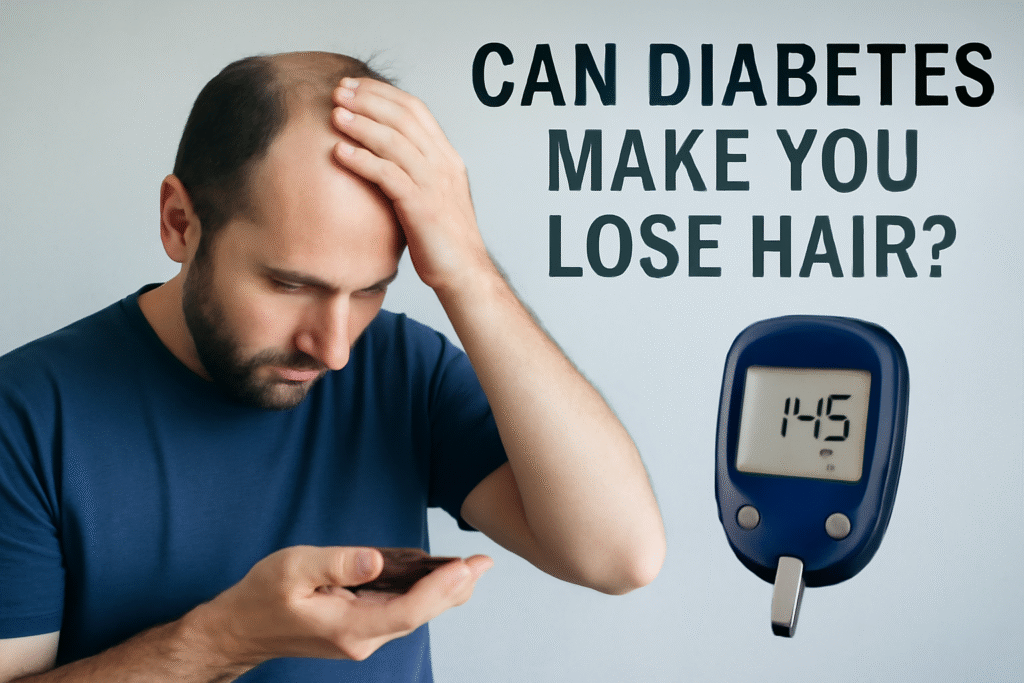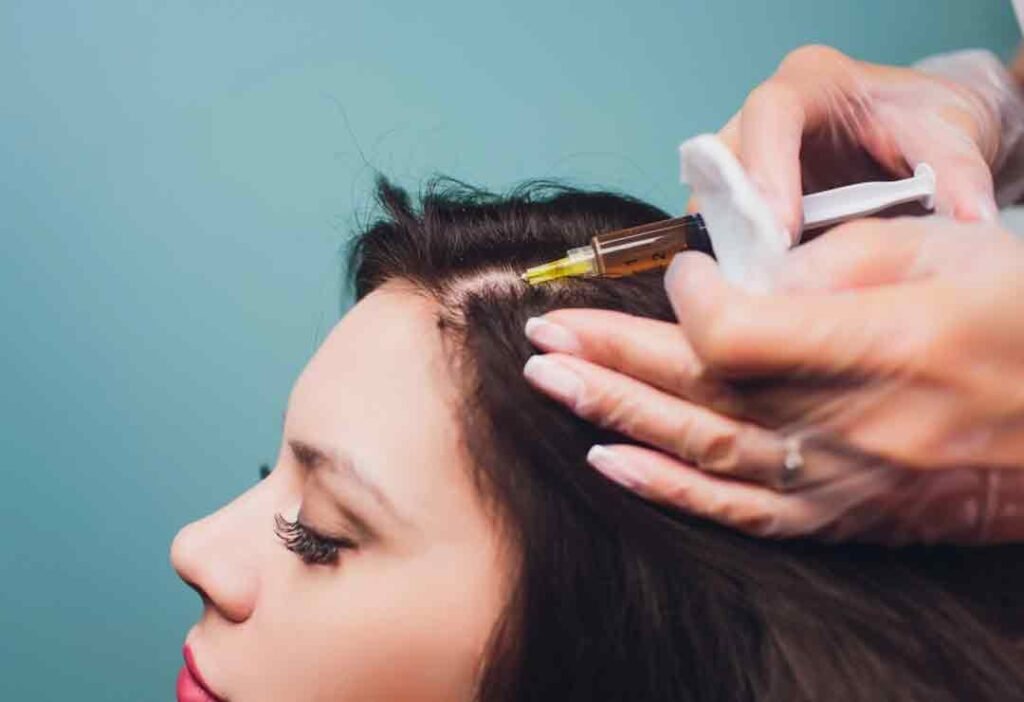Hair loss can be a frustrating and emotional issue, especially if you're managing diabetes. But can diabetes make you lose hair? Yes, diabetes can disrupt hair growth cycles due to poor blood circulation, hormonal changes, and stress on the body. This article explains how diabetes affects your hair, key symptoms to watch for, and how …
Hair loss can be a frustrating and emotional issue, especially if you’re managing diabetes. But can diabetes make you lose hair? Yes, diabetes can disrupt hair growth cycles due to poor blood circulation, hormonal changes, and stress on the body.
This article explains how diabetes affects your hair, key symptoms to watch for, and how to manage or reverse hair loss safely. Backed by medical insights and expert advice, this guide will help you regain control, improve hair health, and feel confident again.

Understanding Can Diabetes Make You Lose Hair
Diabetes affects your entire body, including how your hair grows. It changes the way your body uses insulin and manages blood sugar, which directly impacts circulation and hormone levels—two major factors in hair health.
How Diabetes Affects the Body’s Circulatory and Hormonal Systems
When blood sugar is high, it damages small blood vessels. This reduces oxygen and nutrient delivery to hair follicles, weakening them over time. Hormonal imbalances, especially with insulin and androgens, further disrupt the hair growth cycle.
Why Hair Follicles Suffer Due to Blood Sugar Fluctuations
Hair grows in cycles: growth, rest, and shedding. Diabetes can shorten the growth phase and extend the resting phase. As a result, you may notice more hair shedding and slower regrowth.
Diabetes Type 1 vs. Type 2 – Any Difference in Hair Loss?
Hair loss can happen with both types. However, Type 1 diabetes—being autoimmune—may increase the risk of alopecia areata, a condition that causes sudden patchy hair loss.
Signs of Hair Loss Related to Diabetes
Early detection is crucial. Look out for these diabetes-related hair loss symptoms:
Gradual Thinning of Scalp or Body Hair
A common sign is slow, progressive thinning on the scalp, arms, or legs, especially in areas with reduced blood circulation.
Patchy Hair Loss or Alopecia Areata
Some people with diabetes develop autoimmune disorders like alopecia areata, where hair falls out in small, round patches.
Delayed Hair Regrowth After Shedding
If your hair takes much longer than usual to grow back after falling out, diabetes might be interfering with the growth cycle.
Medical Reasons that Diabetes Can Make You Lose Hair
Several medical processes linked to diabetes contribute to hair thinning or baldness.
Poor Blood Circulation
High blood sugar damages capillaries that feed your hair follicles, weakening their ability to produce strong, healthy hair.
Hormonal Imbalance and Insulin Resistance
Imbalanced hormones lead to changes in testosterone and DHT levels, both known to shrink hair follicles and speed up hair loss.
Stress and Autoimmune Triggers
Chronic stress, common in people managing diabetes, can push hair follicles into a resting phase. Autoimmune responses can also attack hair follicles.
Side Effects of Diabetes Medications
Some medications, such as metformin or statins, may trigger hair shedding in sensitive individuals. Always consult your doctor before switching treatments.
Can You Regrow Hair Lost Due to Diabetes?
Yes, many people regain hair by addressing the root causes, especially with improved health management and lifestyle changes.
Lifestyle and Diet Improvements
- Eat more protein, biotin, and omega-3s
- Stay hydrated and avoid processed sugars
- Exercise to boost circulation naturally
Blood Sugar Management’s Role in Hair Regrowth
Maintaining steady glucose levels improves blood flow, reduces inflammation, and supports follicle function, essential for new hair growth.
Success Stories and What to Expect
Many patients report visible improvements in 3–6 months after controlling their A1C levels and using prescribed treatments. Recovery timelines vary.
Best Treatments for Hair Loss in Diabetics
Your treatment should always align with your diabetes care plan. Here’s what often works:
Topical Treatments (e.g., Minoxidil)
Minoxidil helps stimulate hair growth by improving blood flow to the follicles. It’s widely used and safe for diabetics under supervision.
Nutritional Supplements for Hair Support
Zinc, iron, vitamin D, and biotin are commonly deficient in diabetics and are essential for hair strength and growth.
PRP Therapy and Hair Transplants – Are They Safe?
Platelet-Rich Plasma (PRP) therapy and hair transplants are safe for diabetics with good sugar control. Always consult a dermatologist and endocrinologist before undergoing any procedures.

Natural Remedies with Medical Backing
Aloe vera, pumpkin seed oil, and scalp massage have shown modest benefits. However, always pair them with medical advice.
Expert Tips to Prevent Hair Loss With Diabetes
Daily Habits That Promote Hair Health
- Manage stress with yoga or mindfulness
- Avoid harsh shampoos or heat styling
- Maintain a consistent sleep schedule
How to Reduce Inflammation and Oxidative Stress
Use antioxidant-rich foods (like berries and leafy greens) and anti-inflammatory habits to support follicle health.
Consultation Importance – Dermatologist + Endocrinologist Combo
Collaborating with both specialists ensures that your treatment is safe, diabetes-compatible, and targeted for optimal results.
Medical Sources and Case Studies
Journal Citations on Diabetes and Alopecia
- Journal of Dermatological Treatment (2020): Found strong links between diabetes and hair thinning
- PubMed Central Studies: Cited insulin resistance as a hair cycle disruptor
Patient Experience: A Diabetic’s Journey With Hair Recovery
“After controlling my sugar levels and using minoxidil for 5 months, I noticed fuller hair. It’s not overnight, but it’s real.” — A patient with Type 2 diabetes
Can Diabetes Make You Lose Hair (Before & After Table)
| Month | Treatment Focus | Visible Result |
|---|---|---|
| 1–2 | Blood sugar control | Reduced shedding |
| 3–4 | Supplement use + Minoxidil | New hair sprouts |
| 5–6 | Continued therapy | Noticeable thickness |
When to See a Doctor
Red Flag Symptoms
- Sudden or patchy hair loss
- No regrowth after 6 months
- Unexplained fatigue or skin issues
What Tests Can Diagnose the Real Cause?
- Blood tests: A1C, iron, thyroid
- Scalp biopsy (if needed)
- Hormone level checks
What to Expect in Your Dermatology Visit
Expect a detailed scalp examination, review of medical history, and a personalized treatment plan based on your diabetes status.

FAQs About Can Diabetes Make You Lose Hair
Can prediabetes cause hair loss, too?
Yes. Even in prediabetes, insulin resistance can affect circulation and hormones, increasing your risk of hair thinning.
Is hair loss a symptom of diabetes or something else?
It could be both. Thyroid disorders, stress, and iron deficiency may also cause hair loss. A doctor can help pinpoint the cause.
What is the best shampoo for diabetes hair thinning?
Look for shampoos with caffeine, ketoconazole, or biotin. Avoid sulfates and parabens that dry the scalp.
Should I stop diabetes meds if hair loss worsens?
Never stop medication without consulting your physician. Alternatives may exist that support hair health while managing diabetes.
Start Your Hair Recovery Journey Today
Hair loss doesn’t have to be permanent—even with diabetes. With proper care, professional guidance, and a clear plan, you can restore both your hair and your confidence.
Book a consultation with Dr. Rana Irfan in Islamabad today to get expert evaluation, custom treatment, and support tailored for diabetic hair loss recovery.






